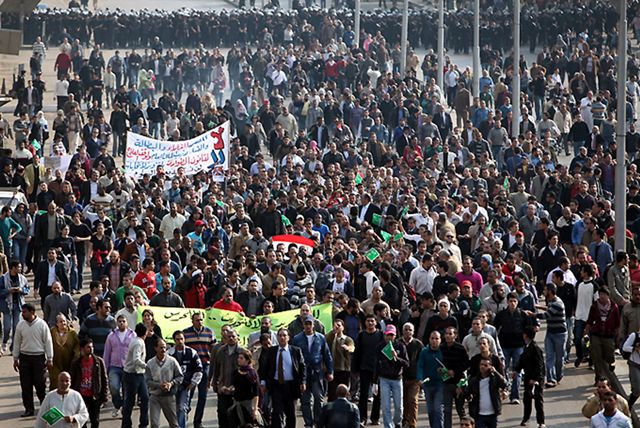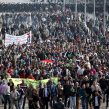
“We Wish to Be In the Front Lines With You”: Islamist Radicals on the Lotus Revolution
Publication: Terrorism Monitor Volume: 9 Issue: 6
By:

Caught off guard no less than Egyptian authorities by the spontaneity of the anti-regime demonstrations that have swept Egypt, the ideologues of the Salafi-Jihadi trend have struggled to somehow incorporate these momentous events within the framework of the greater jihadi cause. While some Western commentators have weaved fantasies about the hidden hand of the Muslim Brothers or even al-Qaeda behind these events, the Salafi-Jihadists are fully aware of the highly limited role they have played so far in a revolt that has a notable absence of any religious dimension. The effective al-Qaeda leader, Dr. Ayman al-Zawahiri (himself an Egyptian militant who fought a failed terrorist campaign against the Egyptian state), has so far maintained surprising silence on the demonstrations in Egypt’s cities. Nonetheless, a number of Salafi-Jihadi ideologues have attempted to insert the movement into events in Egypt, while still acknowledging the difficulty of doing this in a country where decades of struggle have resulted in the imprisonment, exile or recantation of most of Egypt’s once powerful militant Islamist movement.
Thirwat Salah al-Shehata: Back from the Shadows
One of the most surprising statements was attributed to veteran Egyptian jihadist Thirwat Salah al-Shehata, who has not been heard from since his escape from the 2001 collapse of the Taliban regime in Afghanistan. A lawyer from al-Sharqia governorate in the Egyptian Delta, al-Shehata was a colleague of Muhammad Abd al-Salam Faraj, Shaykh Omar Abd al-Rahman and Ayman al-Zawahiri in the incipient Egyptian jihadi movement. A member of the Shura Council of Jama’at al-Jihad bi Misr (Egyptian Jihad Organization), al-Shehata was charged in connection with the assassination of Anwar Sadat in 1981 and served three years in prison.
In 1993 al-Shehata left for Yemen after a series of detentions by Egyptian authorities. He was again charged in the 1994 attempted assassination of Egyptian Prime Minister Atif Sidqi and was this time sentenced in absentia to the death penalty. He left for Sudan during the period of Bin Laden’s residence there before leaving with al-Zawahiri for Afghanistan in 1995. During his stay there he was placed in charge of the movement’s security committee (Al-Ahram Weekly, October 18-24, 2001). In 1999 al-Shehata was sentenced to death in absentia for the second time in Egypt’s “Albanian Returnees” case. In 2001 he is believed to have escaped the American invasion of Afghanistan by fleeing to Iran, where he was reportedly placed under arrest. At that point, al-Shehata basically disappeared from view.
The fate of those al-Qaeda members and associates who sought refuge in Iran after the U.S. invasion of Afghanistan is one of the most poorly understood aspects of the “War on Terrorism.” The question has been subject to speculation loaded with political motivations, but the evidence appears to point to Iranian detention of those who crossed into Iran, either in prisons or under house arrest. Nearly ten years later it seems probable that Iran has begun releasing these individuals (most of whom were likely considered too hot or ideologically unsound to be made use of by Iranian intelligence) from their confinement or has allowed them to leave the country.
In a February 2 message issued by Jama’at al-Jihad in Egypt entitled “A Statement by the Jihadi Leader Thirwat Salah al-Shehata to the Popular Revolution in Egypt,” the long missing jihadist applauded “our defiant Egyptian people, in all segments of society, for their courageous, chivalrous and heroic stance against tyranny,” while urging Egyptians to “continue their march to uproot the Pharaoh and his minions, and purify our precious Egypt from his filth, after years of suffering from humiliation, subjugation, contingency, silencing, imprisonment, torture, disease, hunger, theft and wastage of the umma’s [Islamic community’s] resources, and slavery to the enemy…” The message was sent to the London-based Al-Maqreze Center for Historical Studies, run by Egyptian Islamist Hani Al-Siba’i, and published by the center on its website (almaqreze.net, February 2).
Al-Shehata goes on to explain the absence of the jihadists from the important events in Egypt, making reference to the notorious Abu Za’bal Prison, 15 km from Cairo, where a large number of prisoners including Palestinian and Egyptian militants managed to escape in a January 30 uprising (Asharq al-Awsat, February 2):
"We wish to be in the front lines and participate with you in this great honor and to serve as shields for you, but are prevented from this. We were locked into cells, and the scorpion is severe in its guard duties. Abu Za’bal was filled with mujahideen currently living out their unjust sentences for the rest of their lives. The rest of us were forced to leave the country, after the government launched their war against us, to join the mujahideen in various other fronts."
Al-Shehata made a plea to the Egyptian military and security apparatus to “join the ranks of the masses” and warned Egyptians against settling for a superficial package of reforms:
"Complete the course till its end, and do not suffice with mere ministerial revisions, reduction of prices, raising of wages, nor any other solutions resorted to by dictatorial regimes when the noose is tightened around them. Rather suffice with nothing other than the departure of this rotten Pharaoh and his minions."
Sources “close to Egyptian Islamic Jihad” told an Egyptian daily that al-Shehata had issued the statement from Tehran, where he was a resident (al-Sharq al-Awsat, February 3). The Maqreze Center, however, speculated that al-Shehata is now living in Khurasan (a somewhat ambiguous geographical term that may refer here to Afghanistan and northwest Pakistan, but could also refer to Khurasan Province in Iran).
Abu Mundhir Al-Shanqiti: Denouncing Salafist Inaction
A fatwa (religious ruling) regarding participation in the Egyptian protests was issued on the Minbar al-Tawhid wa’l-Jihad (Pulpit of Monotheism and Struggle) website of Jordanian Islamist Shaykh Abu Muhammad al-Maqdisi, the former mentor of al-Qaeda in Iraq leader Abu Musab al-Zarqawi. The fatwa was the work of Abu Mundhir al-Shanqiti, a regular contributor to Maqdisi’s website, and followed an earlier article by the same author entitled “The Revolt Against Mubarak,” in which he suggested people “claim their rights by force, not by begging” (tawhed.net, January 25).
Al-Shanqiti ruled in favor of participation in the demonstrations, acknowledging that the protestors might succeed in doing something even the “largest jihadi organizations” would find difficult. Like al-Shehata, al-Shanqiti is aware of the weak state of the jihadi movement within Egypt. Nevertheless, he urges any mujahideen still operating in Egypt to participate in the “blessed revolution,” as this would be their “most preferable jihad.” He suggests that ten or even a hundred mujahideen should carry out a martyrdom operation to eliminate Mubarak and his regime “because it is in the interests of Islam and Muslims and defeats the enemies of religion.”
Al-Shanqiti suggests that the demonstrators have only just arrived at the same conclusion reached long ago by the Egyptian jihadi groups – that the Western-supported “corrupt and tyrannical” regime must be overthrown.
The Egyptian Salafists, who have largely abstained from participation in the protests on religious grounds concerning the permissibility of deposing a Muslim ruler, also come in for criticism by al-Shanqiti for their lack of action: “Some affiliated with the methodology of the Salaf leave or abandon all the matters concerning the Muslim umma and have no interests other than their books and papers and study circles, ignoring the words of the Prophet (p.b.u.h.), ‘He who does not care about the affairs of the Muslims is not one of us.’”
The Shaykh compares the Salafists’ inaction to the “passivity of the Tablighi Jama’at,” which would make no changes to its program of peaceful missionary work “even if the Ka’aba was hit by nuclear bombs.” The Salafists warn only of the sin of fitna (creating strife and discord in the Muslim community) “as though they don’t know that people are already full of fitna around them.” The Salafists also warn that Mubarak’s government would likely be replaced by a secular regime that would ignore “the law of Allah,” but al-Shanqiti says this is not necessarily the case, as a new constitution could be created based on the primacy of Islamic law: “The matter is about reducing the evil and achieving what can be achieved from the good.”
A revolution in Egypt would present the West with a serious defeat and the loss of one of its most important client regimes: “This is what explains their strong attachment to the survival of Mubarak… if not for this support he would not have dared to defy the legions that insist on his immediate departure.” According to al-Shanqiti, the U.S. government is following events in Egypt closely and is trying to prepare Muhammad Mustafa al-Baradei as their new client. Israel in particular would lose its “sentry” on the southern border if Mubarak’s regime was overthrown. “If the Egyptian regime fell, God willing, perhaps several other systems would fall down… If the Egyptian regime fell, God willing, there may occur in the region a major earthquake similar to the raids of September 11.”
Hussein bin Mahmud: The Scholars of al-Azhar Must Play a Greater Role
Another commentary appeared on jihadi websites in the form of a question and answer session with Shaykh Hussein bin Mahmud, the pseudonym of a Salafi-Jihadi ideologue who is a regular contributor to Islamist forums and websites (Al-Sharq Al-Awsat, November 30, 2006).
Bin Mahmud denounced those religious scholars in Egypt who are “still in fear of these events and wait to see what unfolds… If the scholars were to come forth, the masses would follow them.” [1] He points especially to the scholars of al-Azhar (the Cairo-based Islamic university that is the center of Sunni Muslim theological studies), advising them to “play a greater role.” He does not, however, have any hope for intervention by the Grand Shaykh of al-Azhar, Dr. Ahmed al-Tayab, whom he describes as “an employee of Hosni [Mubarak]. He is not worth anything.” Al-Tayab was a leading member of Egypt’s ruling National Democratic Party (NDP) until criticism after his appointment to Grand Shaykh led to his official resignation from the party.
The Salafists, however, do not come under the same severe criticisms leveled by al-Shanqiti; Bin Mahmoud appears willing to give them time to realize the important role they should be playing in events: “Some of them have taken praiseworthy stances. However we are waiting for more… We await stronger stances, may Allah protect them and make them steadfast.”
In a commentary posted last year in the wake of the Israeli attack on the Gaza aid flotilla, Bin Mahmud accused Egypt (without specific reference) of “protecting the Jews from outside [Israel’s] borders” by preventing the entry of mujahideen into Palestine. He suggested the military campaign should begin outside of Israel: “Those who want to enter Palestine and fight the Jews must first start with the [Arab] border guards… It is not forbidden to kill the Jewish state’s border guards, even if they pray and fast” (al-Faluja, May 31, 2010).
Conclusion
In their long absence from Egypt, those Salafi-Jihadis of Egyptian origin now find themselves sidelined from events they are unable to manipulate in their favor. Though they may “wish to be in the frontlines,” they are instead reduced to issuing missives that must compete with the violence-denouncing “Revisions” of their imprisoned colleagues, the confused response of the Muslim Brotherhood and the passivity of Egypt’s indigenous Salafist groups. None of these appeals appear to have resonated in any particular way with the Egyptian masses and those who continue to pursue Egypt’s largely secular “Lotus Revolution.” Though many await al-Zawahiri’s response to the events in Egypt, it seems unlikely that any statement from the long absent jihadi leader will have a significant impact on the demonstrators in Tahrir Square, who seek political and economic reforms rather than the establishment of a militant Islamist state.
Note:
1. https://www.shamikh1.net/vb/showthread.php?t=92303.





